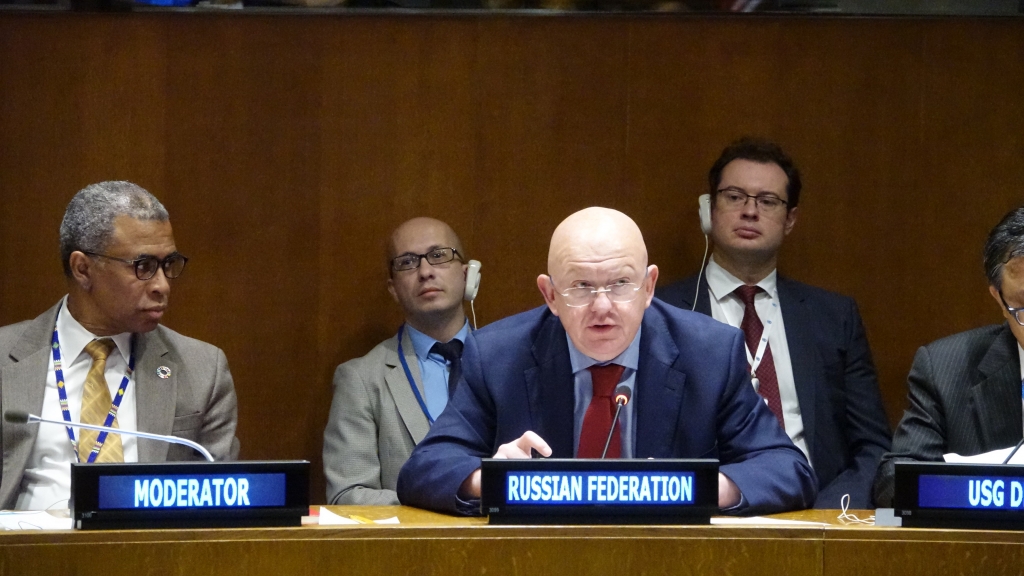Statement by H.E. Mr. Vassily A. Nebenzia, Permanent Representative of the Russian Federation to the United Nations at the High-Level Round Table “Agenda 2030 for Sustainable Development as a Catalyst for Change through Partnership”
Esteemed Minister Vladimir Vladimirovich Makei,
Excellences,
Dear colleagues,
It is a great pleasure for me to speak at the High-Level Round Table dedicated to the implementation of the 2030 Agenda.
Three years since the adoption of the Agenda we see an important progress all over the world in a number of areas. But the global challenges we face today can slow down or even reverse the progress. We are convinced that the development of global cooperation depoliticized and and unconditional based of the principles of trust, openness, transparency and justice with respect for the national circumstances and priorities is badly needed. Without mutual trust, it is impossible to expect effective implementation of the ambitious Sustainable Development Goals or the accomplishment of global tasks and targets of food security, population, healthcare that are crucial for many countries.
An exchange of experience and best practices among countries as well as international partners, establishment of partnerships with private sector are very important.
The Russian Federation achieved great success in implementation of the Agenda 2030 goals at the national level in many areas. We have a lot of progress to be proud of and we are ready to share our experience with others. I would like to inform that the Russian Federation will make its first ever National Voluntary Review on the Agenda 2030 goals achievement at the High-Level Political Forum on Sustainable Development in 2020.
But still there is a lot of room for improvement in many other areas. In this context the Government of the Russian Federation approved this week the National Development Program untill year 2024 aimed at the breakthrough development in scientific, technological, social and economic fields.
At the international arena the Russian Federation has become an active global development cooperation partner, having joined the ranks of donors of international development assistance. Currently, international development assistance is a key component of our foreign policy, and it is increasing in scope and maturing in nature.
It is important to note that the Russian development assistance is fully in line with national priorities of our partner countries, as well as the overall framework of the SDGs.
As of the end of 2017, the overall international development assistance provided by our country, that according to OECD falls under the category of Official Development Assistance, amounted to $1.2 billion.
The sectors that are mainly covered by projects and programmes with the support by the Russian Federation include health (maternal and child mortality, communicable and non-communicable diseases), education, environmental sustainability, food security (“Food for work” programme, school meals), as well as socio-economic development in general, with a focus on poverty eradication. We also pay increased attention to the creation and modernization of trade and economic infrastructure, industry, including through innovation, capacity-building in such areas as fight against terrorism and organized crime, as well as in public administration.
Naturally, the countries of our region are among our strategic partners due to historic, cultural, economic and political links and ties that we share. However our national development assistance is not limited only to the Eurasian space. Among other recipients of our aid are countries of Latin America (up to 3 per cent), South and South-East Asia (about 12 per cent, Sub-Saharan Africa (about 8 per cent) and the Middle East (4.5%).
Assistance channeled through the UN system amounts to 25 per cent of Russian development aid.
In the last three years, we have allocated over $60 million to the implementation of projects by various funds and programmes, in addition to contributions paid to their regular budgets. Further projects for up to $68 million are currently in the pipeline.
Building on this experience, we started working on a solid normative basis for cooperation with leading agencies of the UN development system. This work has already resulted in signing partnership agreements that are strategic in their nature. Among others, the two most recent examples are agreements signed with UNDP and WFP. Similar work is underway with UNICEF and UNIDO.
Our country is actively involved in the international food aid efforts by providing assistance to foreign countries through bilateral channels as well as on a multilateral basis. With the World Food Programme (WFP) alone the Russian Federation annually provides humanitarian food aid worth over $30 million. Between 2003 and 2017 the funds allocated for those goals totaled $333 million.
We apply innovative mechanisms in fostering the international development assistance. In 2017 we launched a large-scale project ($40 million) of converting the Mozambique debt to the Russian Federation into the national school meals programme implemented through the WFP.
On the overall, hundreds of projects are implemented by UN agencies with Russian financial support. However, only a few projects are implemented jointly by them. We see great potential in more active cooperation between the UN organizations in initiating and implementing projects and consolidating not only financial resources but also the experience and unique competence of various agencies.
Russia has been consistently advocating the philosophy of inclusive economic development, this particularly is enshrined in the Greater Eurasian Partnership concept put forward by President of Russia Vladimir Putin. This large-scale project is open to all nations in Europe and Asia, regardless of their membership in various integration associations. Its steady implementation could contribute to the establishment of a space for broad economic cooperation in Eurasia and in the long term it could become the foundation for a reformed architecture of the continent’s security and cooperation corresponding to the realities of the 21st century.
Thank you for the attention.
